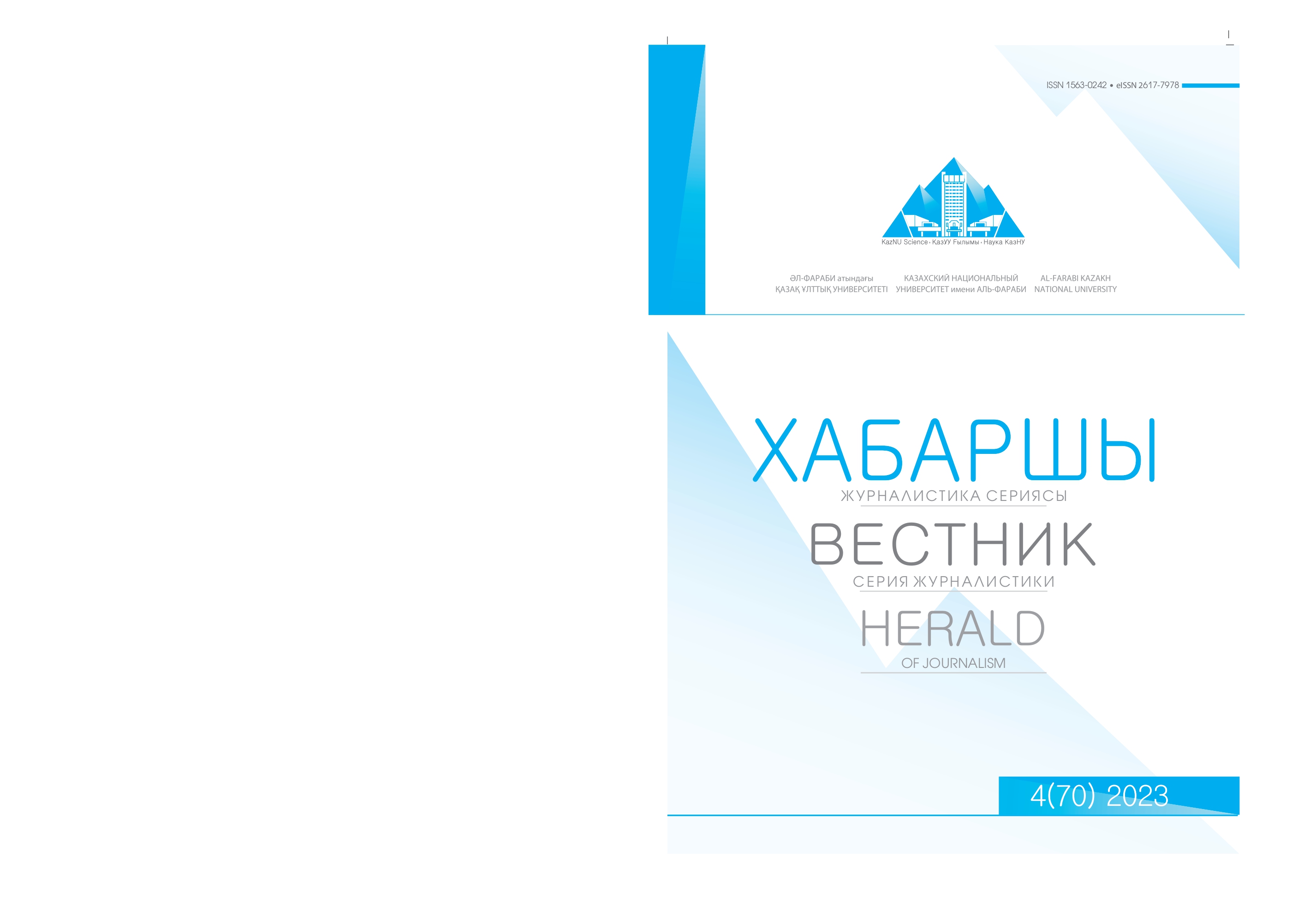The importance of Tleubergen Jumamuratov’s legacy in the development of creative thinking of future journalists
DOI:
https://doi.org/10.26577/HJ.2023.v70.i4.4Keywords:
journalist, creativity, artistic creativity, worldview, skill.Abstract
The power of any society is the quality of knowledge. Journalism education has a decisive force in the socio-economic, political and cultural development of the state. The aim and main idea of the scientific article is to show the importance of fiction in the acquisition by journalism students of such qualities as creative erudition, value orientation, creativity and social thinking.
The scientific and practical significance of the study is that fiction is a great spiritual force that provides a wise conceptual understanding of the problems of society and individuals, but the question of the influence of this important basis on creativity remains an open, unexplored side. In addition, scientific thought about creativity says: “Throughout the entire historical period of the development of philosophy, ideas about creativity have changed significantly. ...Each subsequent stage of research into this category enriched and expanded our knowledge both about it itself and about the possibility of independent creative activity of a person…” (Yagolkovsky S.R., 2007). This point of view also asserts the value of the topic of this study.
The object of study of the problem is the legacy of Tleubergen Jumamuratov (1915-1990), People's Poet of Uzbekistan and Karakalpakstan, laureate of the Berdakh State Prize, who was awarded the Order of the Badge of Honor, Friendship of Peoples, medals and Certificates of Honor from many countries. He worked in the media system and, moreover, for many years was the main consultant at the Writers' Union of Karakalpakstan and had extensive experience working with young authors. He wrote quite a lot of instructions, poetic lessons about the tasks and responsibilities of a creative person to society. The methodology of the work – studying these materials that helps to solve a number of issues related to the training of creative journalists in higher education, as a spiritual, ideological experience, as a sharpening knowledge in the creative process.
References
Avezov M. “Misli raznix let [Thoughts of different years].” Alma-Ata, (1961): (Мыслы разных лет)
Auezov М. “On eki tomdik shigarmalar jinagi [Work in 12 volume collection].” Alma-Ata, Writers’ Print, (1967–1969): (Он екі томдық шығармалар жинағы)
Burgess, A. (ed) (1986) ‘Introduction’ in Daniel Defoe, A Journal of the Plague. Year, [1722], London: Penguin.
Campbell K. (ed) (2004) [2000] Journalism, Literature and Modernity, Edinburgh: Edinburgh University Press.
Carey J. (ed.) (2003) [1987] The Faber Book of Reportage, London: Faber.
Edition from Frolova I.T. “Filosofskiy slovar [Philosophical dictionary].” Politizdat, (1986), (Философский словарь/под. ред. Фролова И.Т. – 5-е изд. – М.)
Jumamuratov T. “Omirinnin ozi filosofiya [Life is a philosophy itself].” Nukus. (2005, 288-89): (Ѳмириннин өзи ‒ философия)
Jumamuratov T. “Qoljazba [Manuscript].” From poet’s home archive. (1995): (Қолжазба). Access date: 17.10.2023.
Jumamuratov, Tleubergen biography, Awards and titles. [An electronic resource]. Access mode: http://jumatleu.uz›index.php?id=biografy. Access date:30.11.2023.
Maqsetov Q. “Qaraqalpaq folkloristikasi [Karakalpak folklore].” Nukus, (1989): (Қарақалпақ фольклористикасы).
Materials from http://jumatleu.uz (Jumamuratov Tleubergen Kupbatulla uly, Biografia [Biography].”(1915-1990): (Биография)
Paxratdinov A. “Xaliq shayirlarinda shayirliqtin kelip shigiui tariyxinan [From the history of emergence of poetics in folk poets].” Nukus, (1980): (Халык шайырларында шайырлыктын келип шығыу тарийхынан).
Yagolkovskiy S.R. «Psikhologiya. Kreativnosti i innovatsiy» [Psychology. Creativity and innovation]. Textbook. M., Publishing house of the State University Higher School of Economics 2007, p.7.













